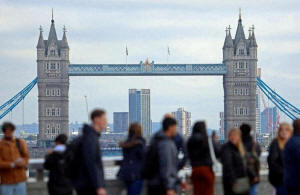UK economy went into recession last year, data confirms
 Send a link to a friend
Send a link to a friend
 [March 28, 2024] By
Suban Abdulla [March 28, 2024] By
Suban Abdulla
LONDON (Reuters) - Britain's economy entered a shallow recession last
year, official figures confirmed on Thursday, leaving Prime Minister
Rishi Sunak with a challenge to reassure voters that the economy is safe
with him before an election expected later this year.
Gross domestic product shrank by 0.1% in the third quarter and by 0.3%
in the fourth, unchanged from preliminary estimates, the Office for
National Statistics (ONS) said on Thursday.
The figures will be disappointing for Sunak, who has been accused by the
opposition Labour Party - far ahead in opinion polls - of overseeing "Rishi's
recession".
"The weak starting point for GDP this year means calendar-year growth in
2024 is likely to be limited to less than 1%," said Martin Beck, chief
economic advisor at EY ITEM Club."
"However, an acceleration in momentum this year remains on the cards."
Britain's economy has shown signs of starting 2024 on a stronger
footing, with monthly GDP growth of 0.2% in January, and unofficial
surveys suggesting growth continued in February and March.
Tax cuts announced by finance minister Jeremy Hunt and expectations of
interest rate cuts are likely to help the economy in 2024.

However, Britain remains one of the slowest countries to recover from
the effects of the COVID-19 pandemic. At the end of last year, its
economy was just 1% bigger than in late 2019, with only Germany faring
worse among Group of Seven nations.
The economy grew just 0.1% in all of 2023, its weakest performance since
2009, excluding the peak-pandemic year of 2020.
GDP per person, which has not grown since early 2022, fell by 0.6% in
the fourth quarter and 0.7% across 2023.
Sterling was little changed against the dollar and the euro after the
data release.
[to top of second column] |

People walk over London Bridge with at a view of Tower Bridge in the
City of London financial district, in London, Britain, October 25,
2023. REUTERS/ Susannah Ireland/File Photo

UK RECOVERY BEGINS SLOWLY
The Bank of England (BoE) has said inflation is moving towards the
point where it can start cutting rates. It expects the economy to
grow by just 0.25% this year although official budget forecasters
expect a 0.8% expansion.
BoE policymaker Jonathan Haskel said in an interview reported in
Thursday's Financial Times that rate cuts were "a long way off",
despite dropping his advocacy of a rise at last week's meeting.
Thursday's figures from the ONS also showed 0.7% growth in
households' real disposable income, flat in the previous quarter.
Thomas Pugh, an economist at consulting firm RSM, said the increase
could prompt consumers to increase their spending and support the
economy.
"Consumer confidence has been improving gradually over the last year
... as the impact of rising real wages filters through into people’s
pockets, even though consumers remain cautious overall," Pugh said.
Britain's current account deficit totalled 21.18 billion pounds
($26.70 billion) in the fourth quarter, slightly narrower than a
forecast of 21.4 billion pounds shortfall in a Reuters poll of
economists, and equivalent to 3.1% of GDP, up from 2.7% in the third
quarter.
The underlying current account deficit, which strips out volatile
trade in precious metals, expanded to 3.9% of GDP.
($1 = 0.7933 pounds)
(Reporting by Suban Abdulla; Editing by William Schomberg and Kevin
Liffey)
[© 2024 Thomson Reuters. All rights
reserved.]
This material may not be published,
broadcast, rewritten or redistributed.
Thompson Reuters is solely responsible for this content.
 |